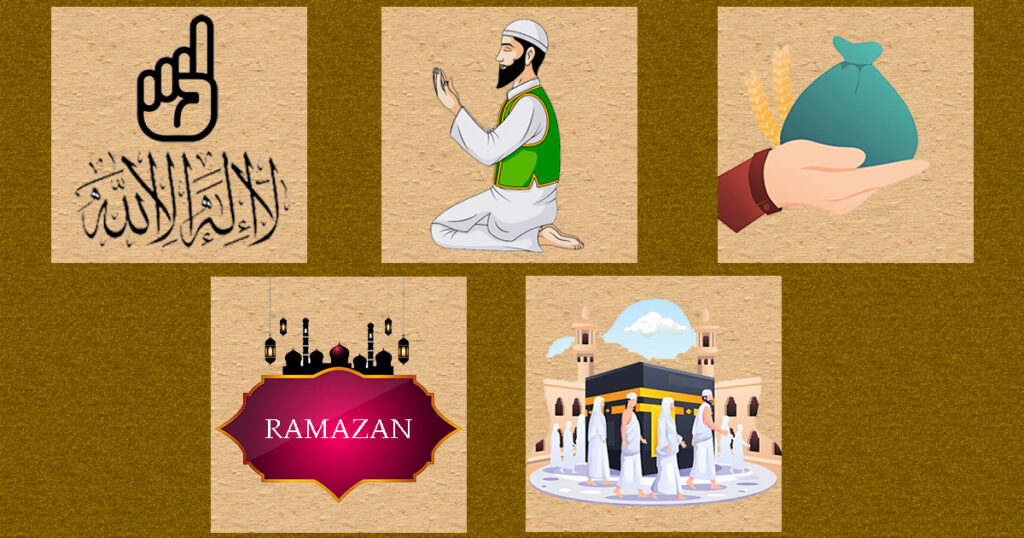
The Five Pillars of Islam are the basic tenets of the faith that hold the entire foundation in place. Every follower is obligated to follow and imbibe these values. It teaches the way of life and makes it part of the routine. These practices strengthen the core and unite people in the community. It is said that God commands Muslims to pursue these values in the form of duties without fail. These pillars are core Islamic beliefs that remind followers of God’s teachings daily and help them put Him first in every aspect of their lives. It helps establish a link between Muslims and the supreme authority. They follow the Prophet’s example in structuring their lives, beliefs, and devotions.
What are the five Pillars of Islam?
✅ Shahada
✅ Salah
✅ Zakat
✅ Sawn
✅ Hajj
👉 Shahada – The Declaration of Faith
The first pillar of Islam is the Shahada, the declaration of faith. Muslims affirm their belief in the oneness of Allah and the finality of the Prophet Muhammad’s message by reciting the Shahada: “La ilaha ill-Allah, Muhammadur Rasulullah,” which translates to “There is no deity worthy of worship except Allah, and Muhammad is the Messenger of Allah.” This declaration serves as a foundation for all other aspects of Islamic life, emphasizing the importance of monotheism and the role of Prophet Muhammad as the last messenger.
👉 Salah – The Ritual Prayer
Salah, the second pillar, refers to the obligatory prayers performed five times daily. Muslims engage in Salah to directly communicate with Allah, seeking spiritual purification, guidance, and blessings. These prayers are conducted at specific times throughout the day, fostering discipline, mindfulness, and community. Muslims face the Kaaba in Mecca while performing Salah, unifying the global Muslim community in their worship.
👉 Zakat – The Obligatory Charity
Zakat, the third pillar, emphasizes the importance of wealth redistribution and social welfare. Muslims who possess the financial means must donate a portion of their wealth to assist the less fortunate. This act of charity purifies one’s wealth and fosters empathy and compassion. Zakat ensures the equitable distribution of resources and helps alleviate poverty, promoting social justice and solidarity within the Muslim community.
👉 Sawm – The Fasting during Ramada
Sawm, the fourth pillar, refers to obligatory fasting during Ramadan. Muslims abstain from food, drink, and other physical needs from dawn till sunset, demonstrating self-discipline, empathy for the hungry, and gratitude for blessings. Fasting is a spiritual practice encouraging self-reflection, increased devotion, and a deeper connection with Allah. It is a time of heightened worship, Quranic recitation, and increased acts of charity.
👉 Hajj – The Pilgrimage to Mecca
Hajj, the fifth pillar, represents the annual pilgrimage to the holy city of Mecca. Muslims worldwide gather to perform specific rituals, following in the footsteps of Prophet Muhammad and the Prophet Ibrahim (Abraham). The pilgrimage provides a profound spiritual experience, fostering unity, humility, and equality among Muslims. It serves as a reminder of the transient nature of life and the ultimate devotion to Allah.
Why are the five pillars of Islam important?
Each of the five pillars works in pair with one another to bring the essence of Islam as a religion of peace and submission to Allah (جل جلاله) into the lifestyle of every Muslim:
Monotheism and the belief in Prophet Muhammad (peace be upon him) as the last messenger of God is the central tenet of Islam around which everything else revolves, and reciting the Shahada (shahadah) in prayer each day reminds Muslims of this integral belief.
Salah (salat) occurs five times a day and offers five different opportunities to remember Allah (جل جلاله) and our purpose in this life to worship Him.
Ramadan requires every Muslim to abstain from their most basic needs and desires, like food, drink, and sexual relations, for some time each day. Every year, the Sawm allows Muslims to gather control over their human needs. Muslims can nurture good conduct and connection to Allah (جل جلاله) without these distractions.
While Sadaqah (charity) is greatly encouraged to be a part of everyday Muslim life, offering Zakat (alms) is obligatory once a year, ensuring that wealth is continuously redistributed to those who need it.
During the Hajj (pilgrimage), Muslims must each wear the same simple garments and perform the same ritual acts of devotion to Allah. Stripped of worldly distinction, people are reminded that all are equal before God.